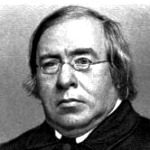Quotes about Works-Good-Positive
Good deeds are such things that no man is saved for them, nor without them.
A Puritan Golden Treasury, compiled by I.D.E. Thomas, by permission of Banner of Truth, Carlisle, PA. 2000, p. 127.
We do good deeds, but God works in us in the doing of them.
The confession of evil works is the first beginning of good works.
And so in the judgment day, the inquiry will be made not into our opinions or professions alone, but into our deeds, as proving the correctness of our faith and the sincerity of our professions.
Faith and works should travel side by side, step answering to step, like the legs of men walking. First faith, and then works; and then faith again, and then works again – until they can scarcely distinguish which is the one and which is the other.
The saints of God are sealed inwardly with faith, but outwardly with good works.
A Puritan Golden Treasury, compiled by I.D.E. Thomas, by permission of Banner of Truth, Carlisle, PA. 2000, p. 127.
Accept the cost of good deeds in time, thought, and effort. But remember that opportunities for doing good are not interruptions in God’s plan for us, but part of that plan. We always have time to do what God wants us to do.
The Practice of Godliness, NavPress, 1996, p. 199. Used by permission of NavPress – www.navpress.com, All rights reserved. Get this book!
The same Christian activity can be either an expression of our own righteousness that we think earns favor with God, or it can be an expression of love and gratitude because we already have His favor through the righteousness of Christ.
Copied from The Gospel for Real Life by Jerry Bridges, © 2002, p. 124. Used by permission of NavPress – www.navpress.com, All rights reserved.
Man’s method of sanctification is by law, God’s method of sanctification is by the Gospel; the former is by works, the latter is by faith, unto works.
At the day of Doom men shall be judged according to their fruits. It will not be said then, Did you believe? But, Were you doers, or talkers only?
We are justified not without works yet not through works, since in our sharing in Christ, which justifies us, [progressive] sanctification is just as much included as [imputed] righteousness.
As the apple is not the cause of the apple tree, but a fruit of it: even so good works are not the cause of our salvation, but a sign and a fruit of the same.
A Puritan Golden Treasury, compiled by I.D.E. Thomas, by permission of Banner of Truth, Carlisle, PA. 2000, p. 127.
Godliness does not qualify us for faith, but Christian faith properly understood is lived.
Titus, Crossway, 2000, p. 280. Get this book!
To properly evaluate the place of good works in the Christian life, we must understand that grace maintains the value of God’s children apart from any merit of their own; but we must also understand that God uses our obedience to promote our good and His glory. By our accomplishments, God works His holy purposes in our lives, provides us with many temporal blessings and, most of all, fulfills our Spirit-instilled longing to honor God with all our heart, soul, mind, and might (cf. Deut. 6:5; Matt. 22:37). While we must be careful not to define blessing only in terms of material possessions or earthly ease, we must also embrace the promise that God “rewards those who earnestly seek Him” (Heb. 11:6).
Works that Really Matter by Bryan Chapell taken from Holiness by Grace by Bryan Chapell, copyright 2001, Crossway Books, a division of Good News Publishers, Wheaton Illinois 60187, www.crosswaybooks.org. Page 208.
Works make not the heart good, but a good heart makes the works good.
A Puritan Golden Treasury, compiled by I.D.E. Thomas, by permission of Banner of Truth, Carlisle, PA. 2000, p. 197.
Faith justifies the person, and works justify his faith.
A Puritan Golden Treasury, compiled by I.D.E. Thomas, by permission of Banner of Truth, Carlisle, PA. 2000, p. 127.
God’s people [are] not redeemed by observing the law, but they were redeemed so they might obey the law.
Piety’s Pattern by Kevin DeYoung taken from The Hole in Our Holiness by Kevin DeYoung, copyright 2012, Crossway Books, a division of Good News Publishers, Wheaton Illinois 60187, www.crosswaybooks.org, p. 45.
There is no righteousness that makes us right with God except for the righteousness of Christ. But for those who have been made right with God by grace alone through faith alone and therefore have been adopted into God’s family, many of our righteous deeds are not only not filthy in God’s eyes, they are exceedingly sweet, precious, and pleasing to Him.
The Pleasure of God and the Possibility of Godliness by Kevin DeYoung taken from The Hole in Our Holiness by Kevin DeYoung, copyright 2012, Crossway Books, a division of Good News Publishers, Wheaton Illinois 60187, www.crosswaybooks.org, p. 70.
We must always insist that there is nothing we can do of ourselves to merit salvation. Salvation is “by grace…through faith” (Eph. 2:8). But when we accept His gift of salvation by faith we must know what this gift includes. We must know that it includes following Jesus as Lord. Otherwise people will think they have been tricked into accepting a way without being told what that way is. It is the grace of God that enables us to follow this way. It is all of grace. But it is a way in which sin is left behind and a righteous life is taken on. And when people accept that salvation that Christ offers, they must know that this is what they are accepting. Otherwise they would not be putting their faith in the Jesus of the Bible.
The Gift of Eternal Life by Ajith Fernando taken from The Supremacy of Christ by Ajith Fernando, copyright 1995, Crossway Books, a division of Good News Publishers, Wheaton Illinois 60187, www.crosswaybooks.org, p. 181.
We must come to good works by faith, and not to faith by good works.
When we take least notice of our good deeds ourselves, God takes most notice of them.
In the lives of many churchgoers today, there is a yawning chasm between profession and action, professed faith and works – and that chasm gives the lie to people’s loud claims to real faith.
Taken from James by Kent Hughes, copyright 1991, Crossway Books, a division of Good News Publishers, Wheaton Illinois 60187, p. 115, www.crosswaybooks.org.
It is better to fail in an attempt to exercise faith than to let it lie dormant and fruitless. God never belittles those who attempt to follow Him, but He does chasten those who refuse to attempt anything for Him.
Taken from James by Kent Hughes, copyright 1991, Crossway Books, a division of Good News Publishers, Wheaton Illinois 60187, p. 259, www.crosswaybooks.org.
The justification of the sinner, it is true, is by faith in Christ and not by works of his own; but the hidden root of faith must bring forth the visible fruit of good works. This fruit is expected by Christ, for it brings glory to the Father and is evidence to the world of the dynamic reality of divine grace. And it is especially in the bearing of much fruit that the Father is glorified (Jn. 15:8).
Are deeds “necessary” for raising the dead and freeing the enslaved? From the standpoint of the Spirit’s work, no. From the standpoint of Christianity’s public credibility, generally yes. The Spirit’s work will produce evidence in our deeds. And every good deed becomes one more witness who testifies on behalf of the gospel’s truth and power.
How shall a work please God, if it proceeds from a reluctant and resisting heart? To fulfill the law, however, is to do its works with pleasure and love, and to live a godly and good life of one’s own accord, without the compulsion of the law. This pleasure and love for the law is put into the heart by the Holy Ghost.
Justification is by faith alone, but not by faith that is alone.
To a believer no law is given by which he becomes righteous before God…because he is alive and righteous and saved by faith, and he needs nothing further except to prove his faith by works. Truly, if faith is there, he cannot hold back: he proves himself, breaks out into good works.
We are not made righteous by doing righteous deeds; but when we have been made righteous we do righteous deeds.
Good works do not make a good man, but a good man does good works.
It is impossible, indeed, to separate works from faith, just as it is impossible to separate heat and light from fire.
Faith, however, is something that God effects in us. It changes us and we are reborn form God, John 1. Faith puts the old Adam to death and makes us quite different men in heart, in mind, and in all our powers; and it is accompanied by the Holy Spirit. O, when it comes to faith, what a living, creative, active, powerful thing it is. It cannot do other than good at all times. It never waits to ask whether there is some good work to do, rather, before the question is raised, it has done the deed, and keeps on doing it. A man not active in this way is a man without faith. He is groping about for faith and searching for good works, but knows neither what faith is nor what good works are. Nevertheless, he keeps on talking nonsense about faith and good works.
Our faith in Christ does not free us from works, but from the false opinions concerning works; that is, from the foolish presumption that justification is acquired through works.
Works are not necessary to earn salvation. But true salvation wrought by God will not fail to produce the good works that are its fruit (cf. Matthew 7:17).
The Gospel According to Jesus, © John MacArthur, 1988, p. 33. Get this book!
Salvation by faith does not eliminate good works per se. It does away with works that are the result of human effort alone (Ephesians 2:8). It abolishes any attempt to merit God’s favor by our works (Ephesians 2:9). But it does not deter God’s foreordained purpose that our walk of faith should be characterized by good works (Ephesians 2:10).
The Gospel According to Jesus, © John MacArthur, 1988, p. 33. Get this book!
It is not that salvation requires faith plus works, but that works are the consequent outgrowth and completion of genuine faith.
Only believers controlled by the Holy Spirit can do genuine good works… Unbelievers can do bad things for bad reasons. They can also do good things, but only out of selfish pride, not for God’s glory. Only the redeemed can do good deeds motivated by a desire to glorify God.
A man’s real belief is that which he lives by. What a man believes is the thing he does, not the thing he thinks.
Works are an evidence of true faith. Graces are not dead, useless habits; they will have some effects and operations when they are weakest and in their infancy… This is the evidence by which we must judge, and this is the evidence by which Christ will judge… Works are not a ground of confidence, but an evidence; not the foundations of faith, but the encouragements of assurance. Comfort may be increased by the sight of good works, but it is not built upon them; they are seeds of hope, not props of confidence; sweet evidences of election, not causes; happy presages and beginnings of glory; in short, they can manifest an interest, but not merit it.
We are justified by faith alone, as the Reformers taught, but not by a faith that is alone. To truly receive the words of God is to intentionally, through a joyous faith in our crucified and resurrected Lord and active reliance upon His Spirit, obey them. Consider that if exposure to God’s word in the spoken gospel and the written Scriptures doesn’t soon change your behavior (even if slower than you might hope), if the transformation of your inner person does not extend to your outer life, you may well be wandering in the dream of those who never knew Him (Greg Morse).
“I Never Knew You” – Fatal Dreams of the Religious Lost, November 14, 2019, DesiringGod.org.
The truth is that, though we were justified by faith alone, the faith that justifies is never alone [it always produces fruit, “good works,”…a transformed life].
Sometimes people are careless and speak disparagingly of all human righteousness, as if there were no such thing that pleased God. They often cite Isaiah 64:6 which says our righteousness is as filthy rags. It is true – gloriously true – that none of God’s people, before or after the cross, would be accepted by an immaculately holy God if the perfect righteousness of Christ were not imputed to us (Romans 5:19; 1 Corinthians 1:30; 2 Corinthians 5:21). But that does not mean that God does not produce in those “justified” people (before and after the cross) an experiential righteousness that is not “filthy rags.” In fact, He does; and this righteousness is precious to God and is required, not as the ground of our justification (which is the righteousness of Christ only), but as an evidence of our being truly justified children of God.
Future Grace, Copyright: Desiring God, 1995, p. 151. Used by permission. www.DesiringGod.org.
Our working is not added to God’s working. Our working is God’s working.
Pray that thy last days, and last works may be the best; and that when thou comest to die, thou mayest have nothing else to do but die.
A Puritan Golden Treasury, compiled by I.D.E. Thomas, by permission of Banner of Truth, Carlisle, PA. 2000, p. 72.
Where there is no sanctification of life, there is no real faith in Christ. True faith works by love. It constrains a man to live unto the Lord from a deep sense of gratitude for redemption. It makes him feel that he can never do too much for Him that died for him. Being much forgiven, he loves much. He whom the blood cleanses, walks in the light. He who has real lively hope in Christ, purifies himself even as He is pure… The faith which has not a sanctifying influence on the character is no better than the faith of devils.
Just as a parent is pleased with the efforts of his little child to please him, though it be only by picking a daisy or walking across a room, so is our Father in heaven pleased with the poor performances of His believing children. He looks at the motive, principle, and intention of their actions, and not merely at their quantity and quality. He regards them as members of His own dear Son, and for His sake, wherever there is a single eye, He is well-pleased.
Evidence, evidence, evidence, will be the one thing wanted when the great white throne is set, when the books are opened, when the graves give up their tenants, when the dead are arraigned before the bar of God. Without some evidence that our faith in Christ was real and genuine, we shall only rise again to be condemned. I can find no evidence that will be admitted in that day, except sanctification. The question will not be how we talked and what we professed, but how we lived and what we did. Let no man deceive himself on this point. If anything is certain about the future, it is certain that there will be a judgment; and if anything is certain about judgment, it is certain that men’s “works” and “doings” will be considered and examined in it (Jn. 5:29; 2 Cor. 5:10; Rev. 20:13). He that supposes works are of no importance, because they cannot justify us, is a very ignorant Christian. Unless he opens his eyes, he will find to his cost that if he comes to the bar of God without some evidence of grace, he had better never have been born.
The only proof of genuine faith, then, is fruitful faith – faith that perseveres and leads to a long-term bearing of fruit, a faith that leads to good works.
Faith is shown as genuine when it is brought to completion by our actions.
A believer does not perform good works to live – but he lives to perform good works.
You see, doing good in dependence on God does just the opposite of paying Him back. All Christian labor for Him is a gift from Him. Good deeds when done as a pure act of His grace do not pay back grace, but borrow more grace from Him. Without God’s grace we would not and could not serve Him. Therefore, even our service does not put Him in debt to us, but rather puts us deeper in debt to His grace. And that is where God wants us to be throughout eternity.
Some will say we need to add “good works” to Christ’s work to be saved. Others will say since we are saved by God’s grace and because all of our sins are already forgiven in Christ we can live as we wish. So, the first says following God’s law is necessary to be saved. The other says following God’s law is unnecessary once saved. Both are terribly wrong! We are saved by grace alone, but the grace that saves is never alone. God’s grace will always give us the desire and ability to follow God. The greatest evidence that we are recipients of God’s grace will be seen through our obedience – not to get saved or stay saved, but proof that we truly are already saved.
True faith will inevitably manifest itself in the performance of works of obedience… The performance of works are the result of faith and the fruit of justification.
The Purpose of God, An Exposition of Ephesians, Christian Focus Publications, 1994, p. 56.
Faith and works are bound up in the same bundle. He that obeys God trusts God; and he that trusts God obeys God. He that is without faith is without works; and he that is without works is without faith.
The heir of heaven serves his Lord simply out of gratitude; he has no salvation to gain, no heaven to lose; … now, out of love to the God who chose him, and who gave so great a price for his redemption, he desires to lay out himself entirely to his Master’s service. O you who are seeking salvation by the works of the law, what a miserable life your must be!… you have that if you diligently persevere in obedience, you may perhaps obtain eternal life, though, alas! None of you dare to pretend that you have attained it. You toil and toil and toil, but you never get that which you toil after, and you never will, for, “by the works of the law there shall no flesh living be justified”… The child of God works not for life; he does not work to be saved, he works because he is saved.
Serving the Lord with Gladness, in Metropolitan Tabernacle Pulpit, reprint Pilgrim Publications, 1989, v. 13, p. 495-496.
Faith shows itself by good works.
Not that our salvation should be the effect of our work, but our work should be the evidence of our salvation.
Although we are sure that men are not saved for the sake of their works, yet we are equally sure that no man will be saved without them.
Saving faith is a working faith. That faith by means of which we are justified is the kind or quality of faith that produces obedience and the fruit of the Spirit. In the absence of obedience, in the absence of fruit, in the absence of submission to the lordship of Jesus, there is doubt whether the faith is saving.
The Lordship Salvation Debate, November 6, 2006, www.enjoyinggodministries.com. Used by Permission.
Holiness and a progressively changed life are not optional. “By this we know that we have come to know him,” says John, “if we keep his commandments” (1 John 2:3). Mere profession of faith, unattended by good works, does not guarantee the reality of faith. We would do well to remember the rebuke of Jesus to those who professed their loyalty and cited their miraculous deeds: “I never knew you; depart from me, you workers of lawlessness” (Mt. 7:23).
The Carnal Christian – Study of 1 Corinthians 3:1-3, November 6, 2006, www.enjoyinggodministries.com. Used by Permission.
Faith, as Paul saw it, was a living, flaming thing leading to surrender and obedience to the commandments of Christ.
Belief is not simply a function of the brain. No, it’s an investment of the heart that fundamentally changes the way that you live.
What makes a good work, good?
1. Done from faith.
2. According to the will of God in Scripture.
3. From the heart.
4. For the glory of God.
We are not saved by good works, but for good works.
Good works will never produce salvation, but salvation should produce good works.
Although good works cannot put away our sins, and endure the severity of God’s judgment, yet are they pleasing and acceptable to God in Christ, and do spring out necessarily of a true and lively faith; insomuch that by them a lively faith may be as evidently known as a tree discerned by its fruits.
True faith goes beyond a simple acknowledgement of God’s existence to a life-changing reliance on who God is, as revealed in the Bible.
Works that are the outflowing of our salvation are never, then, the root or the basis of our right standing before God, but rather they are the fruit or the demonstration of our true salvation. They testify to the genuineness and reality that we are now His children, that His Spirit lives within, and that the faith that brought us justification continues as a living faith now to bring us ongoing sanctification.
Faith is full of good works. It believes as if it did not work, and it works as if it did not believe.
A Puritan Golden Treasury, compiled by I.D.E. Thomas, by permission of Banner of Truth, Carlisle, PA. 2000, p. 127.
It is not right to credit salvation to good works. It is right and necessary, however, to expect good works to follow salvation. Salvation is not the result of good works, but good works are the result of salvation.
Christian: Take Heart! By Permission of the Banner of Truth Trust, Carlisle, PA. 1987, p. 149.
God does not merely save from hell, God saves from sin as well. We may put this another way. An obedient walk is not a cause of salvation, it is an effect of God’s working in the soul. The cause of our salvation is God’s mercy, God’s grace. One result of our salvation – or, one part of our salvation – is our beginning to walk as God wants us to walk. We do not take our steps perfectly. We fail in some instances and in some circumstances. Far too many! But, if we are truly believers, our lives are characteristically right.
Christian: Take Heart! By Permission of the Banner of Truth Trust, Carlisle, PA. 1987, p. 24.
[B]elievers being accepted through Christ, their good works are accepted in Him; not as though they were in this life wholly unblameable and unreprovable in God’s sight; but that He, looking upon them in His Son, is pleased to accept and reward that which is sincere, although accompanied with many weaknesses and imperfections.
A true faith in Jesus Christ will not suffer us to be idle. No, it is an active, lively, restless principle; it fills the heart, so that it cannot be easy till it is doing something for Jesus Christ.
Advance in the Christian life comes not by the work of the Holy Spirit alone, nor by our work alone, but by our responding to and cooperating with the grace the Holy Spirit initiates and sustains.
Spiritual Disciplines for the Christian Life, 1991, p. 243, Used by permission of NavPress – www.navpress.com, All rights reserved. For more information please see the website www.BibicalSpirituality.org. Get this book!








































